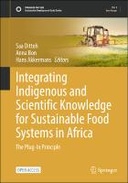Explore

Integrating Indigenous and Scientific Knowledge for Sustainable Food Systems in Africa
0 Ungluers have
Faved this Work
Login to Fave
This open access book presents a novel approach to food security research (SDG-2 Zero Hunger) by integrating indigenous and scientific knowledge. Through extensive field-based research in Burkina Faso, Ghana, Kenya, Mali, and South Africa, it explores the impact of merging traditional practices and local knowledge with scientific methods. Through field studies, the book shows the value of local knowledge and community-led innovations in combating hunger, achieving food security, and enhancing nutrition sustainably and food sovereignty. Drawing on decades of research in rural Africa, the authors introduce the "Plug-In Principle"—a theory for integrating indigenous and modern knowledge systems to foster sustainable agricultural practices and enriched food ecosystems in Africa. The Plug-In Principle advocates that advancements in science and technology should enhance rather than replace existing indigenous knowledge. This principle emerged from the failures of many development interventions where attempts at replacement often led to challenges and failures. In agriculture, for instance, interventions in mechanization, soil amendments, seed and breed improvements, and extension services have seldom succeeded due to a lack of integration with existing practices. The Plug-In Principle emphasizes that effective knowledge integration hinges on a deep understanding and appreciation of prevailing systems. By designing interventions that seamlessly "plug-in" to existing technologies, we can ensure the co-creation of effective solutions to the challenges we face. This book is a testament to the potential of collaborative innovation in fostering sustainable development. Development workers, policymakers, researchers, students, and donor agencies in agriculture and other development areas will find this volume invaluable. Additionally, scholars focused on decolonization and indigenous knowledge in the Global South will uncover insightful case studies and analyses.
This book is included in DOAB.
Why read this book? Have your say.
You must be logged in to comment.
Rights Information
Are you the author or publisher of this work? If so, you can claim it as yours by registering as an Unglue.it rights holder.Downloads
This work has been downloaded 15 times via unglue.it ebook links.
- 15 - pdf (CC BY) at OAPEN Library.
Keywords
- Decolonising food systems
- Indigenous knowledge
- Regreening
- Rural development
- subsistence agriculture
- Sustainable food ecosystems
- Traditional farming systems
- Zero hunger
Links
DOI: 10.1007/978-3-031-85512-2Editions

